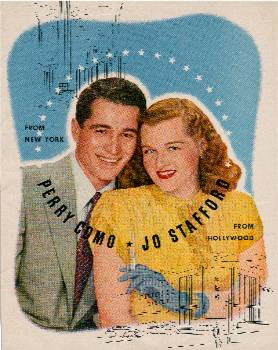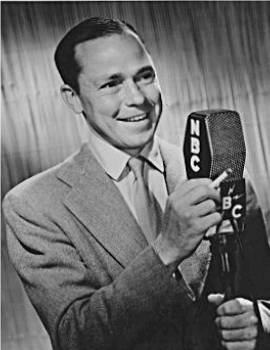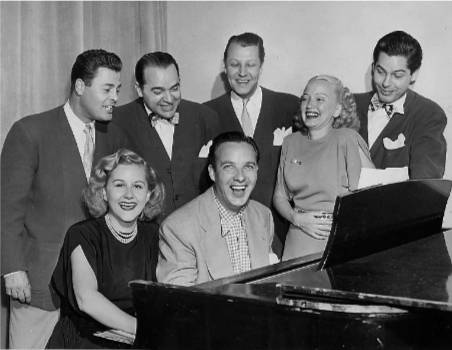The notion of a vocalist going out on his or her own, without the support of a name band, was a fairly revolutionary concept at the time. The big band era had been in full swing since 1935 and, since that time, a myriad of singers had begun to make their names known though recordings and remote broadcasts with the popular orchestras of the day -- but most preferred the security that a job with a big band could provide. On radio, of course, popular vocalists had filled the airwaves with musical shows for most of the 1930s but most of these programs featured singers like Morton Downey or Kate Smith - the sort of mainstream talents that would appeal primarily to the middle-aged breadwinners and housewives who oversaw the family budget and bought the sponsor's products. Sure, sponsors thought, Sinatra is popular among groups of swooning teenagers, but can he sell enough soap to justify his price?
The long-term answer was yes...and no. Sinatra's increased popularity after he left Dorsey would ultimately make him the first superstar of the postwar years, but his success varied as other vocalists jockeyed for his level of acclaim and popularity. Initially, however, his biggest claim to fame was proving for the first time that a band singer could learn his or her craft and build up their name recognition, then go out as solo act and quickly increase the quality of his or her fame, income, and personal appearance tours. Sinatra's simple yet daring decision signaled the beginning of a new trend in the  music business: the rise of the popular vocalist as a dominant force in popular music.
music business: the rise of the popular vocalist as a dominant force in popular music.
In fairness to the kid from Hoboken, as the nation faced the challenges of World War II, the rise of the vocalist and the gradual decline of the big bands became almost inevitable. Ever since the United States had entered the war, bandleaders had been finding it increasingly difficult to maintain the torturous schedule of touring, radio appearances, and recording dates that had made their music so popular. Wartime restrictions on fuel and tires made road tours difficult and shellac, the material used to press 78-RPM records, came into short supply, greatly reducing record production and sales. Likewise, by mid-1942, the draft had already begun to claim many of the talented instrumental soloists and sidemen that were the heart of the band business and their frequently less talented replacements were no match for the abilities of seasoned musicians. Bands that once thrilled audiences with their precise and sparkling arrangements became less predictable as less experienced 4-F musicians took over the seats of those now in the service - and audiences noticed the difference.
 In the eyes of the record companies, recordings made with star vocalists were far cheaper to produce than those featuring name bands. Rather than having to bring in the personnel of a name band for each recording session, house musicians could be used instead. This also allowed arrangers and conductors familiar with the strengths and weakness of a particular performer to handpick the instrumentalists for a particular recording session, as well as use many of these same musicians whenever a performer appeared on the air or in a concert venue.
In the eyes of the record companies, recordings made with star vocalists were far cheaper to produce than those featuring name bands. Rather than having to bring in the personnel of a name band for each recording session, house musicians could be used instead. This also allowed arrangers and conductors familiar with the strengths and weakness of a particular performer to handpick the instrumentalists for a particular recording session, as well as use many of these same musicians whenever a performer appeared on the air or in a concert venue.
By the end of the war, vocalists like Dick Haymes, Jo Stafford, Dinah Shore, Perry Como, Peggy Lee, and a host of others were the stars of the music business, with many appearing on their own network radio programs. As the decade progressed, with the increase in the number of locally produced disc jockey programs, hosts often featured live promotional interviews with singers as part of their daily broadcasts. This programming strategy would, with time, grow into a format that would thrive long after big-time network radio had faded into memory.
 The era of the big bands was, by 1946, officially over and the era of the popular vocalist had just begun. Some gained employment as the featured singer on weekly comedy/variety/music shows like Bob Hope's Pepsodent program (Frances Langford, Doris Day), Paul Whiteman's various shows for ABC (Martha Tilton, Georgia Gibbs), and Joan Davis' comedy series for CBS (Andy Russell). But, overall, the best showcases for the talents of a vocalist were the quarter-hour shows that aired in the early evening hours. Being just fifteen minutes long, they allowed a singer to show off their abilities by singing a song or two, participating in the commercial, introducing a guest (and perhaps performing a duet with them as well), then signing off until the next evening. Shows like this built up tremendous and loyal audiences for sponsors like Chesterfield Cigarettes ("The Chesterfield Supper Club" with Jo Stafford and Perry Como), Campbell's Soup ("Club Fifteen" with, at various times, Dick Haymes, Helen Forrest, Bob Crosby, Margaret Whiting, Gisele MacKenzie, and the Andrews Sisters), and Old Gold Cigarettes ("Songs by Sinatra"). Unlike regular appearances on comedy or variety programs, which frequently required a singer to also do comedy bits, these intimate little musical shows gave audiences the chance to get to know the personality of a performer, enjoy a few tunes, and then look forward to hearing them sing once again in a day or two.
The era of the big bands was, by 1946, officially over and the era of the popular vocalist had just begun. Some gained employment as the featured singer on weekly comedy/variety/music shows like Bob Hope's Pepsodent program (Frances Langford, Doris Day), Paul Whiteman's various shows for ABC (Martha Tilton, Georgia Gibbs), and Joan Davis' comedy series for CBS (Andy Russell). But, overall, the best showcases for the talents of a vocalist were the quarter-hour shows that aired in the early evening hours. Being just fifteen minutes long, they allowed a singer to show off their abilities by singing a song or two, participating in the commercial, introducing a guest (and perhaps performing a duet with them as well), then signing off until the next evening. Shows like this built up tremendous and loyal audiences for sponsors like Chesterfield Cigarettes ("The Chesterfield Supper Club" with Jo Stafford and Perry Como), Campbell's Soup ("Club Fifteen" with, at various times, Dick Haymes, Helen Forrest, Bob Crosby, Margaret Whiting, Gisele MacKenzie, and the Andrews Sisters), and Old Gold Cigarettes ("Songs by Sinatra"). Unlike regular appearances on comedy or variety programs, which frequently required a singer to also do comedy bits, these intimate little musical shows gave audiences the chance to get to know the personality of a performer, enjoy a few tunes, and then look forward to hearing them sing once again in a day or two.
In "Singers of the Big Band Era, Volume 1", a fully restored six-hour collection transferred directly from rare transcription recordings, Radio Archives turns the spotlight on a wide variety of singers in broadcasts dating from between 1944 and 1951. Featured are performances by Peggy Lee, Tony Martin, Jo Stafford, Perry Como, Dinah Shore, Dick Haymes, Johnny Mercer, and Margaret Whiting, as well as lesser-known but equally talented performers such as Georgia Gibbs, Joan Edwards, Bob Crosby, Lena Romay, Guy Mitchell, Ginny Simms, and Dick Todd. Backing up these songsters are the memorable vocal groups of the time, including the Modernaires, the Satisfiers, the Songsters, the Smoothies, the Pied Pipers, and Mel Torme and the Mel-Tones and the orchestras of John Scott Trotter, Albert Sack, Lloyd Schaffer, and many others. Some of the shows in this set come from network broadcasts, while others are edited versions (sans commercials) prepared by the Armed Forces Radio Service. Also included are programs from "Personal Album", a series of shows recorded exclusively for military personnel during World War II and never heard by civilian audiences.
The Peggy Lee Show
with guest star Benny Goodman and Russell Case and his Orchestra
Sunday, July 15, 1951 - 30:00 - CBS, sponsored by Rexall Drugs
The Tony Martin Show
with Georgia Gibbs, Albert Sack and his Orchestra, the Little Sisters and Chorus, and announcer James Wallington
Saturday, July 13, 1946 - 30:00 - CBS, sponsored by Evening in Paris Face Powder
Club Fifteen
starring Bob Crosby and Margaret Whiting with the Modernaires, Jerry Gray and his Orchestra, and announcer Del Sharbutt
Tuesday, October 14, 1947 - 15:00 - NBC, sponsored by Campbell's Soup
The Chesterfield Supper Club (AFRS #288)
starring Perry Como with guest Carole Landis, Helen Carroll and the Satisfiers, Lloyd Schafer and his Orchestra, and announcer Martin Block
Wednesday, April 3, 1946 - 15:00 - NBC/AFRS rebroadcast
The Chesterfield Supper Club (AFRS #289)
Broadcasting live from a TWA Constellation airplane broadcasting 20,000 feet over New York with Perry Como, Jo Stafford, Martin Block, Helen Carroll and the Satisfiers, Lloyd Schafer and his Orchestra, announcer Martin Block, and musical interludes by the Art Van Damme Quintet
Thursday, April 4, 1946 - 15:00 - NBC/AFRS rebroadcast
Personal Album (#565)
with Ginny Simms, the Songsters, and Cookie Fairchild and his Orchestra
1944 - 15:00 - AFRS
Johnny Mercer's Music Shop (#1)
with Jo Stafford, June Hutton and the Pied Pipers, Paul Weston and his Orchestra, and announcer Wendell Niles
June 1944 - 15:00 - NBC/AFRS rebroadcast
Personal Album (#712)
with Dinah Shore, the Joseph Lilly Chorus, and Robert Emmett Dolan and his Orchestra
1945 - 15:00 - AFRS
Personal Album (#698)
with Pat Friday, the Henry Russell Sextet, and Billy Mills and his Orchestra
1944 - 15:00 - AFRS
Across the Board: The Smoothie Song Shop (#89)
with the Smoothies (Babs, Charlie, and Little), Jack Carter on the vibraphone, and announcer Fred Mogul
1944 - 15:00 - AFRS rebroadcast
Your Melody Hour (AFRS #379)
starring Jo Stafford with guest Guy Mitchell and Victor Young and his Orchestra
Sunday, August 5, 1951 - 30:00 - NBC/AFRS rebroadcast
Personal Album (#662)
with Dick Haymes and Gordon Jenkins and his Orchestra
1944 - 15:00 - AFRS
Club Fifteen
starring Bob Crosby and Margaret Whiting with the Modernaires, Jerry Gray and his Orchestra, and announcer Del Sharbutt
Tuesday, November 18, 1947 - 15:00 - NBC, sponsored by Campbell's Soup
Your Hit Parade
with Joan Edwards, Dick Todd, the Hit Paraders, Mark Warnow and his Orchestra, and announcer Kenny Delmar
Saturday, October 27, 1945 - 30:00 - NBC/AFRS Rebroadcast
Personal Album (#713)
with Lena Romay and John Scott Trotter and his Orchestra and Chorus
1945 - 15:00 - AFRS
Personal Album (#666)
with Dick Haymes and Gordon Jenkins and his Orchestra
1944 - 15:00 - AFRS
Swingtime (#24)
with Johnny Mercer, Mel Torme & the Mel-Tones, and PFC Murray McEachern and the Armed Forces Radio Swing Band
1945 - 15:00 - AFRS
The Johnny Desmond Follies
with Audrey Marsh, Herb Shriner, and Jerry Gray and his Orchestra
1946 - 30:00 - NBC/AFRS rebroadcast
Personal Album (#553)
with Ginny Simms, the Songsters, and Cookie Fairchild and his Orchestra
1944 - 15:00 - AFRS